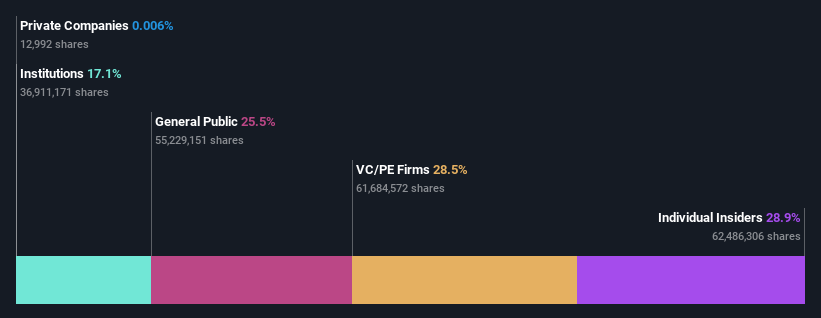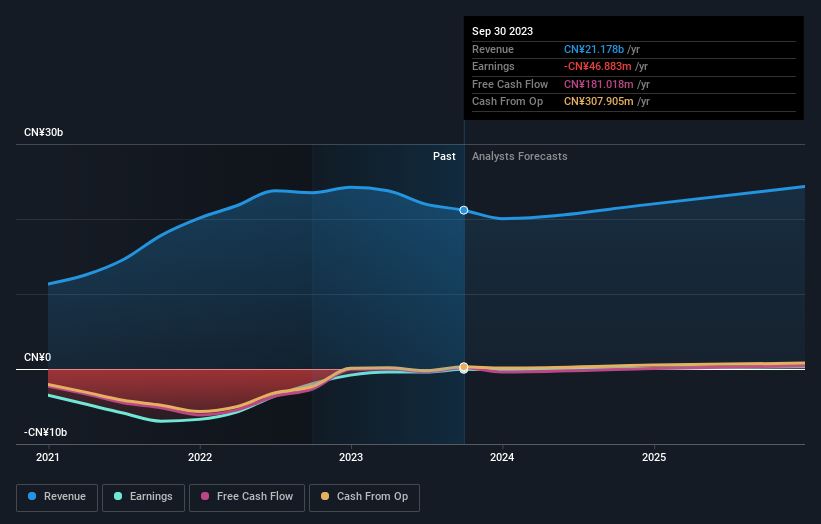Dingdong (Cayman) Limited (NYSE:DDL) CEO Liang Changlin, the company's largest shareholder sees 10% reduction in holdings value
Key Insights
Insiders appear to have a vested interest in Dingdong (Cayman)'s growth, as seen by their sizeable ownership
52% of the business is held by the top 5 shareholders
If you want to know who really controls Dingdong (Cayman) Limited (NYSE:DDL), then you'll have to look at the makeup of its share registry. With 29% stake, individual insiders possess the maximum shares in the company. Put another way, the group faces the maximum upside potential (or downside risk).
As a result, insiders as a group endured the highest losses after market cap fell by US$30m.
In the chart below, we zoom in on the different ownership groups of Dingdong (Cayman).
Check out our latest analysis for Dingdong (Cayman)
What Does The Institutional Ownership Tell Us About Dingdong (Cayman)?
Institutional investors commonly compare their own returns to the returns of a commonly followed index. So they generally do consider buying larger companies that are included in the relevant benchmark index.
As you can see, institutional investors have a fair amount of stake in Dingdong (Cayman). This suggests some credibility amongst professional investors. But we can't rely on that fact alone since institutions make bad investments sometimes, just like everyone does. If multiple institutions change their view on a stock at the same time, you could see the share price drop fast. It's therefore worth looking at Dingdong (Cayman)'s earnings history below. Of course, the future is what really matters.
We note that hedge funds don't have a meaningful investment in Dingdong (Cayman). Looking at our data, we can see that the largest shareholder is the CEO Liang Changlin with 28% of shares outstanding. SoftBank Investment Advisers (UK) Limited is the second largest shareholder owning 6.4% of common stock, and General Atlantic Service Company, L.P. holds about 6.0% of the company stock.
On looking further, we found that 52% of the shares are owned by the top 5 shareholders. In other words, these shareholders have a meaningful say in the decisions of the company.
Researching institutional ownership is a good way to gauge and filter a stock's expected performance. The same can be achieved by studying analyst sentiments. There are a reasonable number of analysts covering the stock, so it might be useful to find out their aggregate view on the future.
Insider Ownership Of Dingdong (Cayman)
While the precise definition of an insider can be subjective, almost everyone considers board members to be insiders. The company management answer to the board and the latter should represent the interests of shareholders. Notably, sometimes top-level managers are on the board themselves.
Insider ownership is positive when it signals leadership are thinking like the true owners of the company. However, high insider ownership can also give immense power to a small group within the company. This can be negative in some circumstances.
Our most recent data indicates that insiders own a reasonable proportion of Dingdong (Cayman) Limited. It has a market capitalization of just US$270m, and insiders have US$78m worth of shares in their own names. It is great to see insiders so invested in the business. It might be worth checking if those insiders have been buying recently.
General Public Ownership
The general public, who are usually individual investors, hold a 26% stake in Dingdong (Cayman). This size of ownership, while considerable, may not be enough to change company policy if the decision is not in sync with other large shareholders.
Private Equity Ownership
Private equity firms hold a 29% stake in Dingdong (Cayman). This suggests they can be influential in key policy decisions. Some investors might be encouraged by this, since private equity are sometimes able to encourage strategies that help the market see the value in the company. Alternatively, those holders might be exiting the investment after taking it public.
Next Steps:
It's always worth thinking about the different groups who own shares in a company. But to understand Dingdong (Cayman) better, we need to consider many other factors.
I like to dive deeper into how a company has performed in the past. You can find historic revenue and earnings in this detailed graph.
If you would prefer discover what analysts are predicting in terms of future growth, do not miss this free report on analyst forecasts.
NB: Figures in this article are calculated using data from the last twelve months, which refer to the 12-month period ending on the last date of the month the financial statement is dated. This may not be consistent with full year annual report figures.
Have feedback on this article? Concerned about the content? Get in touch with us directly. Alternatively, email editorial-team (at) simplywallst.com.
This article by Simply Wall St is general in nature. We provide commentary based on historical data and analyst forecasts only using an unbiased methodology and our articles are not intended to be financial advice. It does not constitute a recommendation to buy or sell any stock, and does not take account of your objectives, or your financial situation. We aim to bring you long-term focused analysis driven by fundamental data. Note that our analysis may not factor in the latest price-sensitive company announcements or qualitative material. Simply Wall St has no position in any stocks mentioned.


